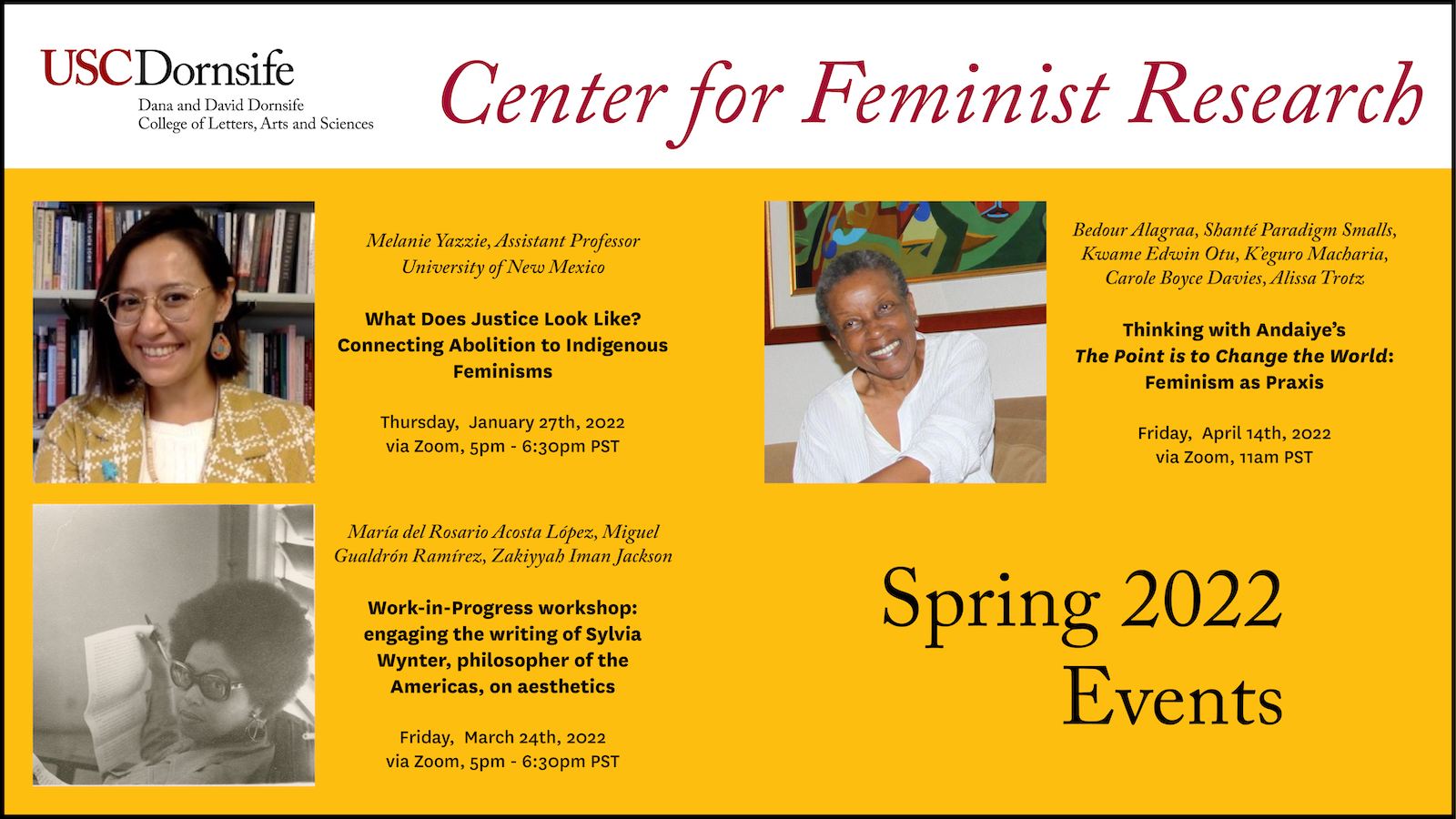
Thursday, January 27th, 2022, 5pm – 6:30pm PST, via Zoom.
Melanie Yazzie.
What Does Justice Look Like? Connecting Abolition to Indigenous Feminisms
Abstract: Over the past two years, we have seen an uptick in Black-led mobilizations for police and prison abolition unfold in tandem with an increase in Indigenous frontline movements to protect land, water, and human relatives. In this talk, I examine the historical and political reasons for the emergence of these seemingly separate political projects and explore the connections between Black-led struggles for abolition and Indigenous-led struggles for decolonization. I specifically ask, What happens when we put radical traditions of abolition in conversation with Indigenous feminisms? What kind of political and historical possibilities arise through their connections?
Friday, March 24th, 2022, 5pm – 6:30pm PST, via Zoom.
María del Rosario Acosta López, Miguel Gualdrón Ramírez, Zakiyyah Iman Jackson.
Work-in-Progress workshop: engaging the writing of Sylvia Wynter, philosopher of the Americas, on aesthetics
University of Southern California’s Center for Feminist Research is hosting a Work-in-Progress workshop on March 24th at 5pm Pacific engaging the writing of Sylvia Wynter, philosopher of the Americas, on aesthetics. The shared text is Wynter’s 1992 article, “Rethinking ‘Aesthetics’: Notes towards a Deciphering Practice.” There will be three pre-circulated papers. Graduate students and faculty from the participants’ respective institutions are invited to comment and engage in a discussion of the papers and Wynter’s philosophy of aesthetics, more generally. To foster the most generative discussion, we strongly encourage attendees to read the Wynter article and the three pre-circulated papers before the meeting date. This event requires that attendees RSVP. Please email CFR(cfr@usc.edu) to request a copy of the Wynter article and the pre-circulated papers, which will be available by March 1st 2022. Once you RSVP, CFR will provide a registration link.
Friday, April 14th, 2022, 11am PST, via Zoom.
Bedour Alagraa, Shanté Paradigm Smalls, Kwame Edwin Otu, K’eguro Macharia, Carole Boyce Davies, Alissa Trotz.
Thinking with Andaiye’s The Point is to Change the World: Feminism as Praxis
Andaiye is a name synonymous with the fight for transformative change in Guyana. She was a champion for women, the working class, the chronically ill, and sexual and gendered dissidents. While a lecturer at Queens College in New York City, between 1972-1977, she became active in what would be known a civil rights, black power, anti-apartheid, and Latin American anti-dictatorial movements. These experiences strengthened and diversified her feminist and anti-imperialist commitments further inspired by revolutions in Nicaragua, Iran, and centrally Grenada. During the 1980’s, she was a guiding force in the Caribbean Association for Feminist Research (CAFRA) and co-founded Red Thread Women’s organization in Guyana, emerging as a key thinker of the international Wages for Housework perspective which evolved into the Global Women’s Strike. The incredible range of her critical thought can be gleaned from her posthumously published collection of writing, The Point is to Change the World, edited by Alissa Trotz. The title comes from Karl Marx’s eleventh and final thesis on Feuerbach (1845): “The philosophers have only interpreted the world in various ways; the point, however, is to change it.” This tremendous collection further cements her place alongside pivotal Caribbean thinkers, such as Elsa Goveia, Aimé Césaire, Édouard Glissant, C.L.R. James, Frantz Fanon, Sylvia Wynter, Suzanne Césaire, George Lamming, Stuart Hall, and Walter Rodney, her comrade in the Working People’s Alliance. Please join Kwame Edwin Otu (University of Virginia), K’eguro Macharia (Independent Scholar), Bedour Alagraa (University of Texas), Carole Boyce Davies (Cornell University), Alissa Trotz (University of Toronto), and Shanté Paradigm Smalls (St. John’s University) for a discussion of The Point is to Change the World.